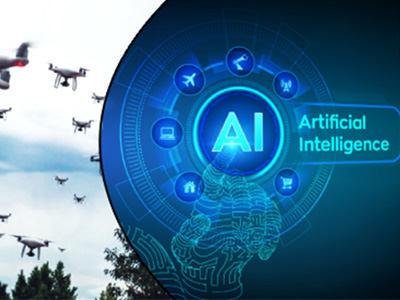What is the Role of Artificial Intelligence in Drone Technology?

The AI is Transforming Drone Technology: Revolutionizing Industries with Advanced Algorithms
Drones have rapidly emerged as a disruptive technology in various fields, including agriculture, construction, and delivery services, among others. With the integration of Artificial Intelligence (AI), drones have become even more versatile, efficient, and accurate in performing complex tasks. AI algorithms enable drones to perform tasks such as object recognition, navigation, and data analysis with greater speed and accuracy. This technology has opened up new possibilities for drone applications, leading to its increasing adoption across various industries. We will delve into the various AI algorithms used in drone technology and examine how they enable drones to perform tasks such as autonomous flight, object detection, and obstacle avoidance. Finally, we will discuss the future of AI in drone technology and its potential to revolutionize the way we work and live.
Overview of Drone Technology
Before delving into the role of Artificial Intelligence in drone technology, it is essential to understand what drone technology entails. A drone is an Unmanned Aerial Vehicle (UAV) that can be controlled remotely or operated autonomously using pre-programmed instructions. Drones come in different sizes and shapes, ranging from small handheld devices to large fixedwing aircraft. They can be equipped with various sensors, cameras, and other technologies that enable them to perform specific tasks efficiently.
Drone technology has been widely adopted in various industries due to its numerous benefits. For instance, drones have significantly reduced the time and cost of data collection in various fields, such as agriculture and construction They have also been used in disaster management, search, and rescue missions, wildlife conservation, and monitoring, among others.
Artificial Intelligence in Drone Technology
The integration of Artificial Intelligence in drone technology has opened up new possibilities and opportunities in various industries. AI refers to the ability of machines to perform tasks that typically require human intelligence, such as perception, reasoning, learning, and decision-making. AI algorithms can process large amounts of data and perform complex calculations, enabling drones to perform tasks more efficiently and accurately.
One of the primary roles of AI in drone technology is autonomous flight. AI algorithms can enable drones to fly autonomously without the need for human intervention. Autonomous flight enables drones to cover larger areas and perform tasks more efficiently. For instance, in agriculture, autonomous drones can be used to monitor crops and detect potential issues such as pests, diseases, or nutrient deficiencies. This enables farmers to take corrective measures in real-time, leading to higher yields and reduced costs.
AI algorithms can also be used to analyze the data collected by drones, enabling them to make more informed decisions. For instance, in the construction industry, drones can be used to collect data on construction sites, such as topography, progress, and safety compliance. AI algorithms can then analyze this data and provide insights into the progress of the project, identify potential issues, and suggest corrective measures.
Applications of AI in Drone Technology
The integration of AI in drone technology has opened up numerous applications in various industries. Some of the applications include:
Agriculture: AI-enabled drones can be used in agriculture to monitor crops and detect potential issues such as pests, diseases, or nutrient deficiencies. This enables farmers to take corrective measures in real-time, leading to higher yields and reduced costs.
Construction: Drones equipped with AI can be used in the construction industry to collect data on construction sites, such as topography, progress, and safety compliance. AI algorithms can then analyze this data and provide insights into the progress of the project, identify potential issues, and suggest corrective measures.
Delivery Services: AI-enabled drones can be used in delivery services to deliver goods to remote areas and areas with poor road networks. Drones can navigate through challenging terrains and deliver goods faster, reducing the time and cost of delivery.
Military and Security: AI-enabled drones can be used in the military and security industry for reconnaissance and surveillance missions. Drones can be equipped with various sensors and cameras that enable them to gather intelligence and detect potential threats.
(This "Security Blogs" Published in June 2023 Edition)













